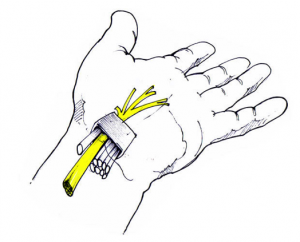Injection or Decompression in Carpal Tunnel Syndrome (INDICATE)
The INDICATE Pilot Study (funded by the British Society for Surgery of the Hand, BSSH) is a pragmatic multicentre study to assess whether a steroid injection given initially is better than having surgery for patients with moderate carpal tunnel syndrome. The pilot will inform the design and conduct of a larger INDICATE study with regards to recruitment, data collection and outcome measurement. The Surgical Intervention Trials Unit (SITU) at the University of Oxford, will co-ordinate the trial. This study will form part of a developing research portfolio for the plastic and hand surgery community.
Background
Carpal Tunnel Syndrome (CTS) is caused by compression of the median nerve in the wrist and presents with symptoms of tingling, numbness and pain in the hand, particularly at night. Patients usually state that the night symptoms are the most troublesome as the pain can be unremitting and sleep can be disturbed every night. CTS is the most common peripheral nerve disorder in the UK.
The treatment of CTS depends on its severity. Severe CTS is generally defined as presence of thenar muscle wasting and constant numbness indicating denervation. 87% of Clinical Commissioning Groups policies state that surgical decompression is warranted when these features are present.
Mild CTS should always be treated non-operatively while moderate CTS can be treated both non-operatively or with surgery. However there is no consensus as to the clinical distinction between mild and moderate CTS.
Steroid injections provide a good initial response in around 70-90% of patients with mild and moderate CTS but relapse is common. The duration of effect varies in the literature but one large recent study showed that 63% of patients had sustained effect after 6 months and this reduced to 34% after 18 months. There is no evidence to guide treatment following relapse of a first steroid injection though if the duration of effect was reasonable, some patients prefer to have further injections and avoid surgery. The natural history of CTS has not been well studied though there is some evidence that some patients with mild CTS improve both clinically and neurophysiologically without treatment.
Carpal tunnel decompression (CTD) surgery is usually performed as a day case under local anaesthesia. It is 90-95% effective in permanently relieving pain, paresthesia and intermittent numbness in CTS. However it incurs more risk and recovery time for the patient and expense to the healthcare system.
Across England, there is variability in Clinical Commissioning Groups’ (CCG) policies for funding referral for CTS, which leads to inconsistency in treatment. Both the variability in the CCGs’ policies and clinician’s approach to treatment stem from the paucity of good evidence on which to base treatment decisions. Therefore for patients with moderate CTS, the dilemma of whether to opt for surgery or steroid injection remains.
Aims
The objectives of the INDICATE Pilot Study are to:
- Ability to recruit to the trial
- Withdrawal rate
- Identifying challenges and areas of concern in recruiting from the current patient pathway
- Patient feedback on the questionnaires/outcome measures
- Complications/Adverse Events
Patients will be recruited from primary and secondary care, depending on the patient pathway in their local area. Follow up data will be collected via postal questionnaires at 1, 3, 6, and 12 months randomisation.
The INDICATE Team
Will Mason, Chief Investigator, Gloucestershire Royal Hospital
Danny Ryan, Specialist Trainee Trauma & Orthopaedics, Severn Deanery
David Beard, Director, Oxford Surgical Interventional Trials Unit
Cushla Cooper, Trial Manager, Oxford SITU
Nicola Farrar, Research assistant, Oxford SITU
Jonathon Cook, Methodologist, Oxford SITU
Ines Rombach, Statistician, Oxford SITU
Julie Hapeshi, Deputy Director, South West Research Design Service
Hui-Ling Kerr, Specialist Trainee Trauma & Orthopaedics, Severn Deanery
Asif Khan, Specialist Trainee Trauma & Orthopaedics, Severn Deanery
Madeleine Dakin, Lay member and chairman of Patient Liaison group
Will Haynes, General Practitioner and Gloucestershire CCG Musculoskeletal Lead
Tim Holt, General Practitioner and NIHR Academic Clinical Lecturer, University of Oxford
Participating sites
- Gloucestershire Royal Hospital (Chief Investigator, Mr Will Mason)
- Royal Bournemouth Hospital (Principle Investigator, Mr Simon Richards)
- Canterbury and East Kent Hospital (Principle Investigator, Dr Jeremy Bland)
- Orthopaedic Assessment Service in Somerset (OASIS) East (Principle Investigator, Caroline Clements)
- Orthopaedic Assessment Service in Somerset (OASIS) West (Principle Investigator, Carolyn Nation)
Timeline
- 2013 BSSH Award
- March 2014 Surveys & Audits undertaken
- September 2014 Protocol development
- May 2015 Ethics application
- June 2015 Site Set-Up
- July 2015 Patient recruitment
- October 2016 Pilot Follow up complete
Contact Details
indicate@ndorms.ox.ac.uk
Supported by:



